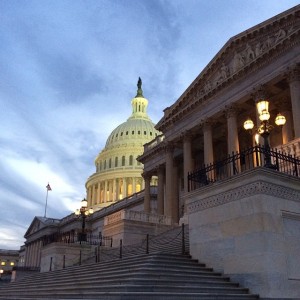On the Hill: Senate Establishes Human Rights Caucus
Today is Human Rights Day, which according to the United Nations was created by the UN General Assembly in 1950 “to bring to the attention ‘of the peoples of the world’ the Universal Declaration of Human Rights as the common standard of achievement for all peoples and all nations.” The Universal Declaration of Human Rights affirms the right of human beings to certain protections, such as the right to a fair trial, the right to freedom of movement, and other concepts that are fundamental to any modern democratic system of government.
The American Humanist Association has been a leading supporter of human rights, issuing board resolutions as early as 1951 about the topic and lobbying government officials to respect human rights and to pass legislation protecting these rights. The AHA Board of Directors even called for the creation of Humanist Study Groups to review the Universal Declaration of Human Rights and to see how it might be applied to American society.
Humanism itself is a strong proponent of a global standard of human rights because humanists believe that all human beings are deserving of a dignified and productive life free from arbitrary punishment or harassment. That’s why some of the leading human and civil rights advocates, such as Asa Philip Randolph, have been humanists. Humanists recognize that certain rights must be protected if our society is to endure and prosper, and we also recognize that we don’t need to believe that these rights are bestowed upon us by a creator in order to be supporters of human rights.
Thankfully, some members of Congress are now joining humanists in our advocacy on behalf of human rights. Senators Chris Coons (D-DE) and Mark Kirk (R-Ill) recently formed a bi-partisan Senate Human Rights Caucus to raise human rights concerns before our nation’s legislature. According to a press release, “The Caucus will hold monthly staff-level briefings on key topics, as well as periodic Member-level events to boost awareness and spearhead solutions to worldwide injustices and abuses. In bringing Congressional-level attention to global human rights issues that the public may be unaware of, the Caucus will be able to provide a voice to the voiceless and work to provide a lifeline to those suffering at the hand of repressive regimes.”
Congress is infamous nowadays for being a notoriously gridlocked and hyper-partisan institution, so positive steps toward emphasizing the importance of human rights is worth noting. With countless human rights abuses happening daily around the world, from religious oppression by the Islamic State to restrictions on the rights of people to live free from religion, this new caucus and progressive advocacy organizations like the American Humanist Association can do much to improve the lives of countless human beings around the world. Individual humanists can also participate, either by donating to human rights groups or by taking some time to volunteer on behalf of one of these groups. Together, we have the potential to ensure that human rights are not just guaranteed for the privileged few of us that were born in democratic nations, but to make sure that they are protected for all.

